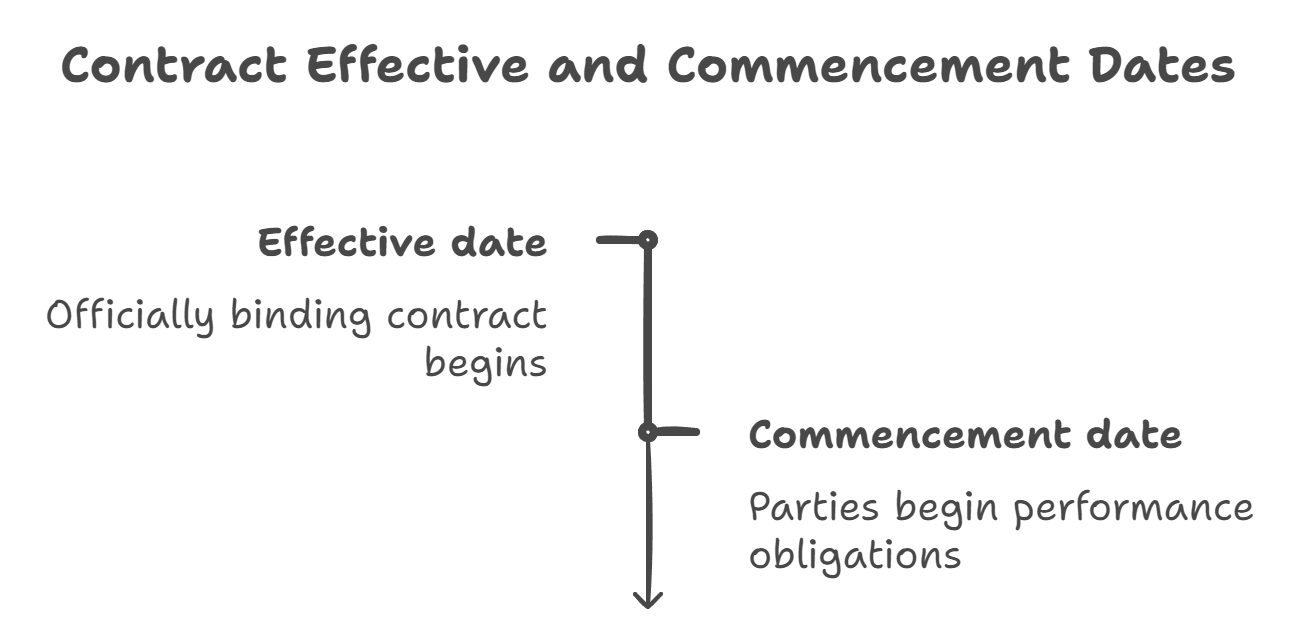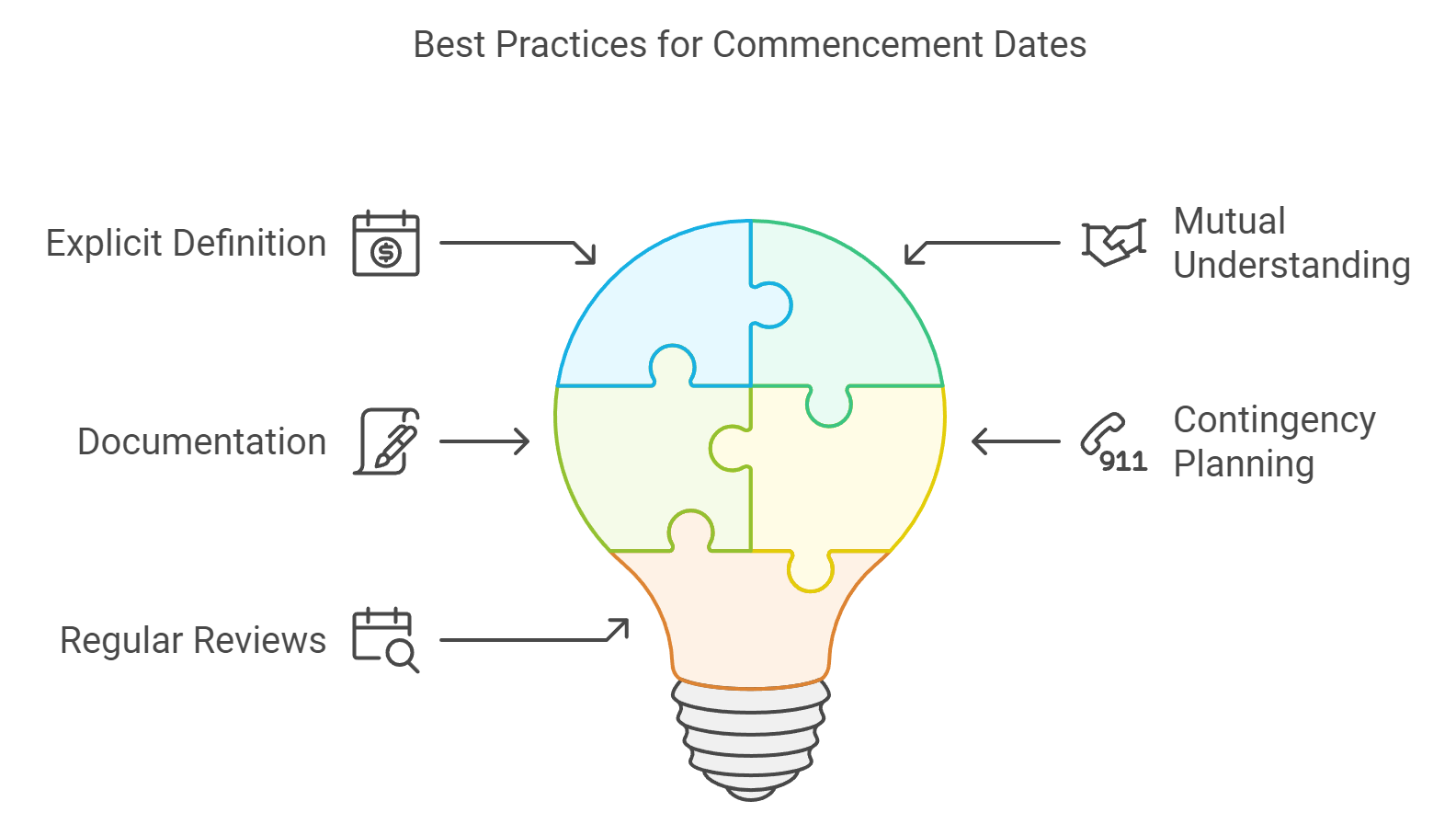What does 'commencement date' mean?
The commencement date is the time or date that a contract becomes officially effective and therefore, legally binding. This guide demystifies the concept, offering clear definitions, the distinction from effective dates, and practical tips to handle commencement dates adeptly in any agreement.

What is a Commencement Date?
A commencement date (or commence date) is the official start date of an agreement, contract, or project that parties have mutually agreed on. On this date, the terms of the contract become legally binding, and obligations, such as payments, deliveries, or services, begin.
It is distinct from the date of the contract’s signing; the commencement date is when the contract’s terms come to life and start affecting both parties’ responsibilities and rights.
Imagine you’ve just bought a new car. You’ve negotiated the price, you’ve chosen the color, and you can’t wait to take it for a spin. But there’s a catch: you can only start driving it from a specific date. That’s your commencement date — the day you can officially hit the road.
 The day of contract signing is not equal to the commencement date.
The day of contract signing is not equal to the commencement date.
Understanding the commencement date’s place in a contract is like having a map before you embark on a journey. It guides you through the important steps in contract management like timeline, highlighting when to start, what to expect, and when to anticipate key milestones.
Understanding the Commencement Date
“Commencement date” — the term is tossed around in boardrooms and on construction sites, but pinning down its meaning can be as slippery as a politician’s promise. To put it simply, the commencement date is the trigger that sets the contract’s wheels in motion.
An illustrative example is a lease agreement. The day the tenant can move into the property — that’s the commencement date. Or consider a service agreement; the commencement date would be when the service provider is required to start fulfilling their duties. This date is essential because it is also typically when obligations like payments kick in. In other words, it’s the start of the business relationship in practical terms.
However, there’s a caveat: The commencement date isn’t always explicitly stated in the contract. Sometimes it’s tied to the completion of a condition or an event, like obtaining a permit or approval. In such cases, understanding the commencement date requires an eye for detail and often a discussion with all parties involved to ensure mutual understanding and agreement.
In contract management, clear definitions are your best friend, and with commencement dates, it’s no different. It’s about setting expectations and eliminating ambiguity, so there are no surprises. After all, in the world of contracts, surprises are about as welcome as a storm cloud at a picnic.
Starting Off on the Right Foot in Contract Management
The contract is finally on your desk. The negotiations have concluded, the terms are set, and the future looks promising. As you peruse the final draft, ready to leave your signature on the dotted line, you encounter a term that’s as critical as it is often misunderstood—the ‘commencement date.’ This seemingly innocuous term can be the difference between a smooth partnership and a rocky start.
The Role of Commencement Date in Contracts
Commencement Date vs. Effective Date
On a chilly autumn evening, two entrepreneurs shook hands in a cozy coffee shop, marking the conclusion of a deal they’d been hashing out for months. As they parted ways, one mused over the effective date of the contract — the day their agreement was legally binding. Yet, the work wouldn’t start until the commencement date, which was set for the beginning of the upcoming spring, to align with the business cycle.
This anecdote illustrates the dance between the effective date and the commencement date. The effective date is often the day the contract is signed, though not always — it can be set to a future or past date with mutual agreement. However, it’s the commencement date that tells the parties when to roll up their sleeves and get to work.
- Effective date: The anchor that secures the contract in the legal realm, marking when it becomes officially binding.
- Commencement date: The catalyst that sets the contract in motion, signaling when parties should begin their performance obligations.



Difference between effective and commencement dates.
Understanding this interplay is critical. Imagine a contract with an effective date of January 1st, but a commencement date of March 1st. The time in between might be used for preparation, obtaining necessary permits, or setting up logistics. No major obligations are expected until the commencement date, but the contract is in force and legally binding from the effective date. It’s essential for all involved to understand these terms to plan resources and manage expectations.
Determining the Date of Commencement
Decoding the Details: Identifying Your Commencement Date
Imagine, James, a project manager, who had everything ready for the new project. The contractors were lined up, the materials sourced, but he overlooked one crucial detail — the commencement date was tied to a specific permit that hadn’t yet been approved. This oversight led to delays and a costly renegotiation of terms.
James’s story is a cautionary tale about the importance of clearly determining the date of commencement. If the contract specifies a date, that’s your start line. If it mentions an event or condition, like James’s permit, that must occur first, the commencement date is contingent and requires close monitoring to ensure all conditions are met in a timely fashion.
When the date of commencement isn’t explicitly stated, it’s crucial to get clarity before moving forward. This might require a meeting or written clarification to ensure there’s no room for interpretation. James learned that the hard way. Be proactive in defining this date; it can prevent disputes, maintain relationships, and keep your projects on track.
Real-world Implications of Commencement Dates
Stories from the Frontline: When Dates Make a Difference
Let’s look at the example of Sara. Sara’s catering business was bustling with activity as she prepared for a grand wedding slated for the spring. The contract with the wedding planner was clear: the commencement date for her services was linked to the day of the wedding. But as fate would have it, the wedding was rescheduled due to unforeseen circumstances. Thankfully, the contract considered such eventualities, and the commencement date shifted accordingly, preventing any financial penalties for either party.
This, albeit made up, real-world scenario underscores the practical implications of commencement dates. In leasing agreements, for example, a clearly defined commencement date is crucial for tenants and landlords to understand when rent is due and when the property can be occupied. In construction contracts, the stakes are high; the commencement date affects scheduling, resource allocation, and can influence penalties for delays.
The takeaway is clear: the commencement date affects cash flow, project planning, legal rights, and obligations. Getting it wrong can mean lost revenue, strained relationships, and legal battles. It’s a key piece of any contractual puzzle, and its implications ripple through the duration of the contract.
Best Practices for Defining Commencement Dates
Clear as Day: Crafting Unambiguous Commencement Dates



Best practices for commencement dates.
Let’s distill some best practices for defining commencement dates, the kind that contract managers, with over a decade of experience, would recommend:
Explicit Definition: Always specify the commencement date within the contract text. If it’s contingent on an event, detail the exact conditions and expected timeframe.
Mutual Understanding: Before signing, ensure all parties have the same understanding of when and how the commencement date is determined.
Documentation: Any changes or adjustments to the commencement date should be documented and signed by all parties involved.
Plan for Contingencies: Consider what happens if the commencement date can’t be met. Include clear terms for extensions or delays.
Regular Reviews: Keep the commencement date under review, especially if it’s contingent on external factors. This ensures that all parties remain informed and can prepare for any changes.
The rule of thumb is simple: treat the commencement date with the same care as you would the financial terms of a contract. A well-defined commencement date can be the linchpin of a successful contract execution.
FAQs on Commencement Dates
Contracts are not just documents; they’re commitments carved in paper. And like any commitment, clarity is key. Here are answers to some frequently asked questions about commencement dates:
- What happens if the commencement date is on a weekend or public holiday?
- Typically, contracts stipulate that if the commencement date falls on a weekend or public holiday, it defaults to the next business day. This should be explicitly stated in the contract to prevent any confusion.
- Is the commencement date the same as the start date?
- The commencement date and start date are often the same, but not always. 'Start date' may refer to when actual work or service begins, whereas 'commencement date' often refers to when contractual terms take effect. This distinction should be clarified within the contract itself.
- What if the commencement date needs to be changed?
- Any changes to the commencement date should be mutually agreed upon by all parties and documented in writing. This amendment should be added to the contract to reflect the new agreement and ensure that all parties have a common understanding.
- Does the commencement date affect the contract's termination date?
- In fixed-term contracts, the commencement date can impact the calculation of the termination date. It’s crucial to accurately define the commencement date to ensure the end date is correctly determined in line with the contract’s terms.
The Takeaway: Why Commencement Dates Are Key
As we wrap up, one thing is clear: commenement dates are not mere formalities but pivotal elements that drive the engine of contractual agreements. Whether you’re a seasoned contract manager or new to the world of legal documents, understanding the commencement date is understanding the pulse of the contract’s life cycle.
The commencement date is more than a marker; it’s a commitment to action, a promise of progress, and a symbol of mutual agreement.
In contract management, precision and foresight are your best allies. The well-defined commencement date is both a shield against disputes and a foundation for successful relationships. As you step forward into your next contractual agreement, remember the power of clarity and the significance of that seemingly simple date. Let it be a reminder that in contracts, as in life, beginnings matter.
Please keep in mind that none of the content on our blog should be considered legal advice. We understand the complexities and nuances of legal matters, and as much as we strive to ensure our information is accurate and useful, it cannot replace the personalized advice of a qualified legal professional.

Table of contents
Want product news and updates? Sign up for our newsletter.
Other posts in Contract-Management

How to Review Business Contracts Like a Pro in 2025
When it comes to business contracts, what you don’t catch can hurt you. That’s why reviewing a business …

10 Best Contract Lifecycle Management Practices in 2025
Remember when closing a deal meant printing five copies, couriering them for “wet” signatures, then hunting …

How to Write a Contract Proposal (+Examples)
Imagine a freelance marketing consultant gearing up to pitch their services to a mid-sized tech company. …
Contracts can be enjoyable. Get started with fynk today.
Companies using fynk's contract management software get work done faster than ever before. Ready to give valuable time back to your team?
Schedule demo

